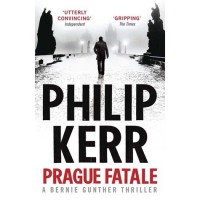Prague Fatale (Bernard Gunther, #8)
 Phillip Kerr’s iconoclastic German police detective, Bernie Gunther, returns from the Eastern Front to his Kripo homicide office in Berlin, wracked with guilt over what he was forced to do in Belorussia. The last thing he wants is to spend a holiday in Czechoslovakia with the new Reichsprotector, Reinhard Heydrich, the boss he fears and hates. But as Gunther says, no one says no to Heydrich. To make matters worse, Heydrich has invited some of the most heinous Nazis to his estate to celebrate his new appointment. Nothing could make this assignment more dreadful—until one of Heydrich’s adjutants is found murdered in his locked bedroom.
Phillip Kerr’s iconoclastic German police detective, Bernie Gunther, returns from the Eastern Front to his Kripo homicide office in Berlin, wracked with guilt over what he was forced to do in Belorussia. The last thing he wants is to spend a holiday in Czechoslovakia with the new Reichsprotector, Reinhard Heydrich, the boss he fears and hates. But as Gunther says, no one says no to Heydrich. To make matters worse, Heydrich has invited some of the most heinous Nazis to his estate to celebrate his new appointment. Nothing could make this assignment more dreadful—until one of Heydrich’s adjutants is found murdered in his locked bedroom.Kerr’s Prague Fatale is a classic locked-door mystery, but this is no Agatha Christie cozy. To identify the killer, Gunther must peel back the layers of corruption, greed, and hypocrisy of the Nazi aristocracy. The mystery’s solution, however, is classic Christie.
Prague Fatale’s narrative has a straight-forward timeline without the back-and-forth flash backs of the preceding two Gunther books, If the Dead Not Rise and Field Gray. This brings it more in line with Kerr’s original Berlin Noir Trilogy. This book was written about time when debate raged in the United States over so-called “enhanced interrogation” techniques, and Kerr includes a lengthy and detailed description of waterboarding. Interestingly, the Nazi didn’t call it torture either.



